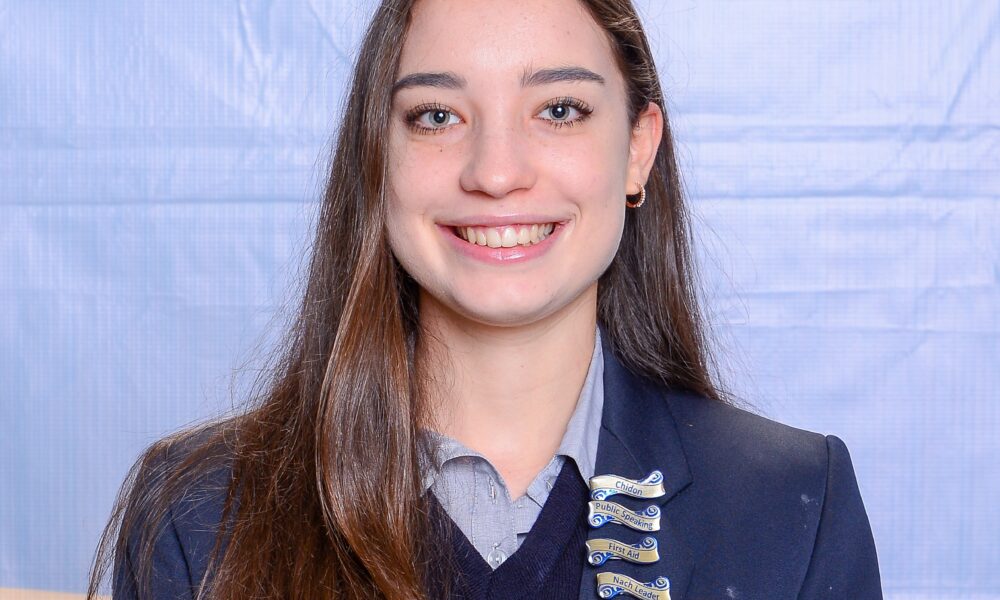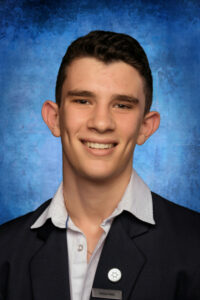Youth
Embrace change and grow – what we’ll do differently

Rosh Hashanah is a time to consider the changes and improvements we can make in our lives. The SA Jewish Report asked Jewish school students what they would like to do differently in the new year, and how they would bring about these changes.
Noah Zive, Grade 11, Herzlia High School

Fellow Herzlia pupils have suggested doing more acts of kindness, wanting to be more confident, eating more kosher food, and saying prayers more frequently. These are all amazing ideas, but I would like to touch on how we speak.
We often don’t realise the impact our words have. One thing can make or break someone’s day. Remember to spend each day saying one extra kind thing to someone you love because eventually it adds up.
Another element is trying not to speak lashon harah (slander), no matter how tempting it may be. We often don’t realise the importance of this, and how it would improve our year to go out of our way to stop talking about others.
It’s important to keep your speech clean in general, and as holy and as kind as possible. We don’t realise the impact our words can have.
Hannah Sophie, Grade 11, Yeshiva College

Every year, glittering inspiration flashes through my mind. I will be better. I must be better. This year, I’m dumbfounded. How do I create realistic change? Not too lazy, not too ambitious, just realistic.
The words of my maths teacher echo through my mind: “Three hundred and sixty degrees is a revolution, a full circle.” Three hundred and sixty four days later, I’ve come all the way back to where I started. To avoid repeating the same aimless circular motions, I have to scrutinise myself in the mirror – more than myself, the bog of confusion that clouds my gaze.
The next year is unpredictable and completely unknown. However, my future has one defining feature – I’m in it! So that’s what I’ll focus on. Not on others or my impact on them, but I’ll start with the source. I’ll aim to make personal changes that can be realised even if it’s 1% better each day, which is 1% ahead of yesterday’s self, and one step closer to next year’s salvation.
Meah Radford, Grade 11, King David High School Victory Park
As we contemplate our hope for a sweet year ahead, I wonder what truly makes a year sweet? Ourselves.
We’re given a choice, a second chance to shape the upcoming year. The pivotal question we all ponder is, “What am I going to do differently?”
The new year is like a blank canvas, waiting for us to paint it in vibrant colours. Yet, we cannot miss this opportunity – these alterations require thoughtful consideration. This is our spiritual chance to set forth on a path of positive transformation, one paved with success and happiness.
This day serves as an occasion to communicate with Hashem, seeking guidance for the changes I aspire to make in my life. Knowing that I have a divine guide assures me that, as I approach 5784 after this upcoming new year, I’ll have realised my aspirations. Though I may not be able to change the essence of my life, I can certainly mould it according to my desires within certain constraints.
This time of the year grants me the opportunity to deepen my connection with Hashem, finding peace through life’s challenges, and nurturing self-love. It calls for heightened awareness of my own needs and desires, and a stronger belief in myself. So, as I dip that apple in honey and take the first bite, I embark on the journey of 5784, hand in hand with my loved ones. It will be a journey filled with length and depth, an experience that will shape the course of my life, for each action carries profound consequences.
Dina Scop, Grade 11, King David High School Victory Park
As Rosh Hashanah approaches, I think about the goals I can set for myself. Although it seems simple, I struggle. At first, I want to change the world. I write myself an in-depth checklist, stating all the charities I’ll donate to and all the organisations I’ll volunteer for. However, it’s unrealistic. A Grade 11 student cannot possibly carry it all. If I cannot change the world and make an instrumental difference, what goals can I set for myself? With this, I begin to compile a new list, one that’s more realistic but just as important:
As the new year approaches, I want to give others the benefit of the doubt; and smile more. So often, I find myself looking at a situation from my viewpoint and forget to include a broader perspective. When looking at a situation from the perspective of the speaker, a whole new world emerges. Listening and discussing their perspective gives me a new way to solve my own challenges.
My great-grandmother used to tell us to “smile, it costs nothing but makes a big difference to someone else’s day”. When I remember her words and apply them, I notice that I actually have a different day. I feel more gratitude and enjoyment. Not only does smiling improve someone else’s day, it improves my own.
This Rosh Hashanah, even though I might not be changing the world, I will still strive to make a difference in my life and to those around me.
Shira Ephron, Grade 11, King David High School, Victory Park
My first goal for the new year is to improve the way I treat myself as an individual, the way I speak to myself, and to create a space for myself just to “be”.
We can either hinder our growth or foster it. I need to get out of my comfort zone, because the things I found daunting last year now seem routine this year. I hope with the current Grade 11 tests and expectations that worry me, in the new year, I’ll look back and think that they were nothing to worry about.
Another goal is to be present in the now instead of having an ocean of “what ifs” and “whys”. I can practice being present simply by sitting in nature or meditating and doing nothing. With social media or school, we never have moments just to breathe and hear the rustling of nature and traffic.
The next goal is to learn to listen and not just answer. When people tell us a story, our first instinct is to reply or think of a story that can relate to theirs. I want to learn to listen. I want to discuss topics and not debate them. A conversation isn’t always about winning an argument. This skill takes time and practice.
The last goal is to try not to control life and rather enjoy it. Trying to control life is like trying to stop popcorn kernels from popping in the microwave under pressure. Life is unpredictable, and it’s about embracing the good, the bad, and the ugly.
Yona Treger, Grade 11, Yeshiva College
In the intricate fabric of our lives, we often encounter new people, each with their own unique stories and potential. Among these encounters, some develop into deep connections, while others remain passing acquaintances.
Occasionally, by chance, we’re bestowed with the precious gift of authentic friendships. This year has been truly exceptional in terms of these connections.
Unfortunately, there’s the all-too-common narrative of relationships fading away.
As I look ahead to the coming year, I’m determined to maintain the bonds forged during my various adventures.
The exceptional individuals I had the privilege of meeting during my time on the Johannesburg Junior Council hold a special place in my heart. Their stories, perspectives, and dedication have left an enduring mark on my soul. As our council term nears its end in November, I aspire to continue to nurture and sustain our connections.
Community is an enduring pillar of Jewish life. Through these connections, we not only pay homage to our cultural heritage, but also satisfy our need for deep and lasting bonds. In this commitment, we discover purpose, and in these connections, we find the comforting embrace of belonging.
Chayale Goldman, Grade 11, Torah Academy
Why is it that only a third of alcoholics manage to stop drinking after attempting to do so? Why are nearly one in three adults overweight when it’s known that obesity leads to depression? If you know that something is bad for you, why can’t you stop doing it?
“Chains of habit are too light to be felt until they are too heavy to be broken,” says American businessman and philanthropist Warren Buffet.
Each one of us suffers daily not only from one bad habit but many. When we’re anxious or bored, we rush to perform actions to give us feelings of relaxation or contentment and replace the feelings of emptiness and frustration.
When I’m bored or stressed, the first thing I do is turn to my fridge. Our stress hormones react by releasing cortisol, which makes us crave fatty, sweet, and salty foods in order to fuel our brain to fight off the pressure. Stress eating becomes a habit which we need to eliminate. Sleeping the right amount of hours every night, eating a healthy diet, and exercising often are healthier ways to cope with stress.
The key to eradicating bad habits is to replace them with better ones. But, if we want the transformation to be successful, we need to set realistic goals, know why we’re determined to get rid of the habit, and identify the triggers along the journey. This can be a slow process.
A typical example of a bad habit is having late nights. I used to be unable to get out of bed, and I would spend 45 minutes being irritated as I would continuously put my alarm clock on snooze. Going to bed late, cramming my studies, being unable to wake up, and feeling exasperated. became a daily pattern until I recognised the foolishness of my actions, and slowly changed my sleeping habits.
In his book Atomic Habits, James Clear says of maintaining good habits, “Do it often before you do it perfectly. Focus on who you want to become, not on what you want to achieve.”
My message in the month of Elul is to change your habits, otherwise your habits will change you.
Shaina Rodal, Grade 10, Torah Academy
As Rosh Hashanah approaches, we try to be better Jews by connecting to Hashem in various different ways. We do teshuvah.
Teshuvah literally means “to return”. The high holidays may seem daunting to some and it may be perceived as unrealistic to become a better person. However, from the theme of the season – teshuvah – we know that we must return. Return means you were once there before. Hashem isn’t asking us to change our whole lifestyle, Hashem is asking us to return to our roots.
No-one is born bad. The choice about what we’ll make of our existence, whether we’ll be virtuous or immoral, is in our own hands.
When the cycle of life ends and our neshoma leaves the body, Hashem won’t ask us why we weren’t like someone else, Hashem will ask us why we weren’t like ourselves.
It’s a lesson for us to be the best version of ourselves all the time.
Mendy Uzvolk, Grade 7, Torah Academy Boys High
Rosh Hashanah is a new beginning. It’s a perfect time to contemplate our past year and change what we’re dissatisfied with.
Here’s a simple example. There was once a little boy who had a messy bedroom. The boy’s mother constantly begged him to clean his room, but he never did. One day, he decided to do so, just to make her happy. First, he began by taking everything out of the room and sorting through it. Then, he brought the things he wanted back inside the room, and organised them neatly.
Once he had finished, he called his mother to come and look. The boy’s mother was delighted to see what he had accomplished, and asked him how it felt to have such a clean bedroom. He replied that he felt less stressed, disturbed, and free to think straight.
In the same way, we can purify ourselves by taking everything out, sorting through it, and bringing back the things that we want, leaving behind what we don’t want.
Having said that, this year I would like to leave behind the negative way in which I sometimes see things.
Yossi Shaw, Grade 11, Torah Academy Boys High
In life, change is essential to becoming a better human. But too much change isn’t necessarily a good thing. In order for change to be a process of transformation, it needs to be done slowly with concentration. Rushing it might lead to not completing it or slipping back to old ways.
It’s important to take on the challenge of continuous improvement, and to have the ambition of doing more than before. We need to improve constantly and push others to change themselves as well.
“Change” could apply to pushing ourselves out of our comfort zone. My example is Cycalive, in which five groups of schools cycle from Johannesburg to Durban in five days. On the second day of Cycalive, I decided that I didn’t want to get back on the bike. I felt unfit and the least experienced in my group. But the others weren’t happy with my decision, and wanted me to push myself. With their encouragement, I forced myself out my comfort zone. I loved it, and it gave me the confidence to ride as much as I could over the course of Cycalive. I learned to change my state of mind.
Change is essential. Improve yourself at your own pace, and strive to go beyond your comfort zone, as shown in the example above. Change may be beneficial or disadvantageous. In the end, it’s up to you how far you’re willing to go to change yourself.
Yeshaya Glass, Grade 10, Torah Academy Boys High
The word “change” is important. A seed needs water, sunlight, and moist soil to sprout. Then it starts its journey of changing and growing into a fully-fledged tree, which is then able to convert carbon dioxide to oxygen and bear tasty fruit.
Similarly, we also need things like a loving home, education, and good friends to evolve. As I grow up, I start to realise that my needs are changing. As a child, my parents took care of my every need. As a teenager, I’m beginning to take on more responsibilities such as getting a job; helping make a minyan at shul; doing chores around the house like making supper; taking the trash outside; and cleaning my room instead of making my parents clean it up.
I will soon have to start studying for my learner’s license, and begin saving money for leaving home and living independently. But before I can begin my own life, I need to acquire certain tools. These are taught to me by role models. The strongest is my brother. He has inspired me to be a happy person and always be sensitive and fair. My parents have also taught me much about life. They have shown me what it means to be a proud Jew; that the Torah is a great way to live life; as well as giving me an appreciation of the history of our nation. I cannot describe my gratitude.
Another tool is education. This includes how to live life knowing the difference between what’s moral and immoral; polite and impolite; appropriate and inappropriate. Education makes me feel proud and confident. It will prepare me for finding a job or getting accepted into a university.
Being aware of society is also helpful for fitting in and making new friends in different places.
Change is essential for growing, being independent, and able to enjoy life. The world is continuously changing. Therefore, it’s important to embrace change.